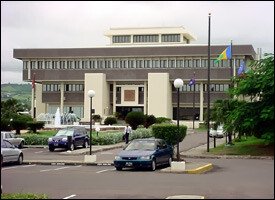
ECCB Headquarters – St. Kitts
Basseterre, St. Kitts – Nevis
August 13, 2013 (CUOPM)
The St. Kitts – Nevis based Eastern Caribbean Central Bank (ECCB) has taken control of two indigenous banks in Anguilla.
“After due consultation with the Monetary Council, the Eastern Caribbean Central Bank (ECCB) has been directed by the Monetary Council to exercise the powers conferred on it by Part II A, Article 5B of the ECCB Agreement Act 1983 and assumed control of the Caribbean.
Commercial Bank (Anguilla) Limited (CCB) and the National Bank of Anguilla Limited (NBA),” said Chairman of the ECCB Monetary Council, St. Kitts and Nevis‘ Prime Minister and Minister of Finance, the Rt. Hon. Dr. Denzil L. Douglas.
He said in a statement released by the ECCB, that the decision was taken after very careful reflection and consultations which have been taking place over a period of time involving several parties.
“The discussions have been spearheaded by the ECCB, which is the regulator for domestic banking in Anguilla and the other member territories of the Eastern Caribbean Currency”.
Union (ECCU). They have taken place with the two banks which have been subject to both onsite and offsite inspections. The ECCB has also met with the Anguilla Financial Services Commission, which has responsibility for supervision of the off shore financial sector,” said Prime Minister Douglas.
He said that the British Foreign and Commonwealth Office has also been in close touch with the ECCB on the condition of the two indigenous banks in Anguilla.
“The matter has been taken up at the Monetary Council’s Ministerial Sub-committee on Banking, whose mandate is to treat with the stability, safety, and soundness of the banking sector,” said Dr. Douglas, adding: “In the face of growing disquiet with the operations of these banks, the ECCB made a presentation to the Ministerial Sub-committee on Banking which led to a recommendation from the Sub-committee that section 5B should be invoked.”
That recommendation was accepted and accordingly, effective 12 August 2013 at 2:00 p.m., the Eastern Caribbean Central Bank has assumed responsibility for the management and oversight of the daily operations of the Caribbean Commercial Bank (Anguilla) Limited and the National Bank of Anguilla Limited.
Until further notice, the ECCB under this statute has the power to investigate the affairs of the financial institution concerned and any of its affiliates and to appoint a person or persons for that purpose; to such extent as it thinks fit, to assume control of and carry on the affairs of the financial institution and, if necessary, to take over the property and undertaking of the Financial institution; take all steps it considers necessary to protect the interests, and to preserve the rights of depositors and creditors of the financial institution; and to restructure the business or undertaking of the financial institution or to reconstruct its capital base.
Prime Minister Douglas said that the Monetary Council, in exercising its mandate to maintain stability and to promote economic development in its member territories, has been very mindful of the very significant role indigenous banks have played.
The Council is committed to a sound and stable Indigenous banking sector and has advocated the consolidation and amalgamation of this sector in the ECCU Eight Point Stabilisation and Growth Programme.
The ECCB has indeed successfully undertaken this mandate in Montserrat and Antigua and Barbuda.
The Council has approved a resolution strategy for the financial sector which is being facilitated by technical assistance provided by the International Monetary Fund (IMF) and The World Bank, which has been funded by the British and Canadian Governments.
The strategy applies to Anguilla as a member of the ECCU and therefore provides additional resources for resolving the banking situation in that country.
“We can assure the people of Anguilla that we have taken this action with their best interests in mind. As a full member of the Eastern Caribbean Currency Union we are mindful of our responsibilities to Anguilla given its current difficulty. It is of the utmost importance that the people of Anguilla support this programme by carrying on their normal activities at both banks so that we can see this episode in the country’s history through to a successful conclusion,” said the ECCB Monetary Council Chairman.